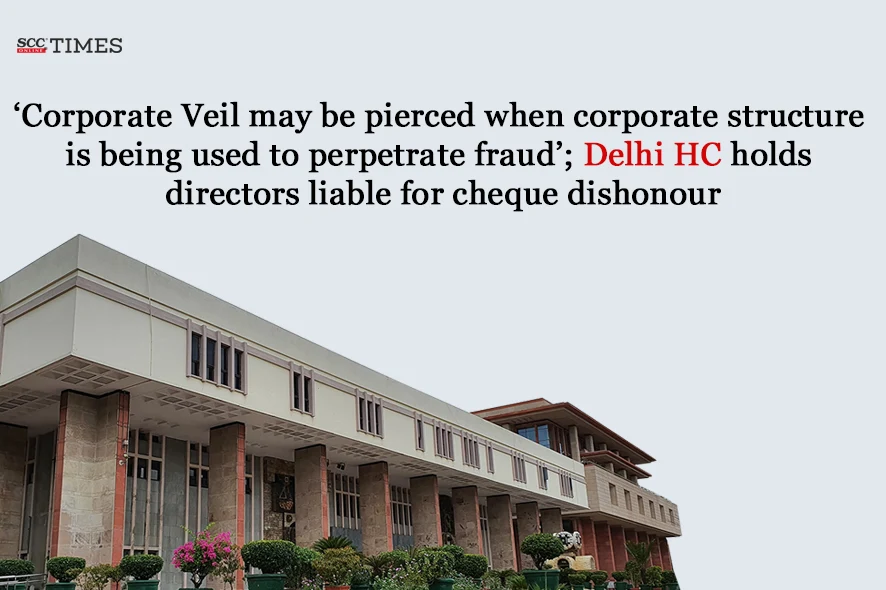Delhi High Court: In a revision petition filed against the order passed by the District Commercial Court, Saket, wherein the District Court had pierced the corporate veil to hold the petitioners personally liable for dishonour of cheque, the Single Judge Bench of Amit Mahajan, J*, opined that where the corporate structure is being used for illegal activities, the Court is empowered to disregard the separate legal entity accorded to the company to hold the directors personally liable.
Background
Respondent 1 had supplied several steel pipes and tubes to Respondent 2 company (hereinafter Respondent 2) for their various projects for which payment was due. Respondent 2 had issued two cheques in favour of Respondent 1 company (hereinafter Respondent 1) which, when presented for encashment had returned unpaid. Despite service of a legal notice, the cheques had remained unpaid and consequently a recovery suit had been filed.
The Court had decreed the suit in favour of Respondent 1 and noted that the act of Respondent 2 of issuance of cheque and the same being dishonoured with a remark of ‘funds insufficient’ was indicative of mala fide intent to evade payments due and payable to Respondent 1. The Court had consequently directed Respondent 2 to clear all outstanding dues against Respondent 1.
The petitioners were directors of Respondent 2 when cheques were issued to Respondent 1. The cheques issued to Respondent 1 had been signed by Petitioner 1. The petitioners had left India and had been declared proclaimed offenders. The Execution Court had noted that Respondent 2 was indulging in defrauding the people and that the petitioners were involved in issuance of cheques that were dishonoured. The Execution Court also noted that at the stage of execution proceedings, corporate veil could be lifted, thereby making the petitioners liable.
The petitioners contended that the Execution Court failed to test the parameters for lifting of corporate veil. They also contended that to pierce the corporate veil, the Execution Court ought to have established that the directors were engaging in fraudulent activities, failing which the corporate veil could not be lifted.
Analysis, Law and Decision
The Court noted that the general principal is that the directors or persons responsible for managing the affairs of the company cannot ipso facto be made liable for all debts and liabilities of the company. However, this rule is not absolute and when the corporate structure is misused to perpetrate fraud or commit other illegal activities, the corporate veil may be pierced, and the directors may be made personally liable.
The Court observed that the petitioners were the only directors of Respondent 2 at all times including the time of issuance and dishonour of cheques. The propensity of the petitioners to first issue cheques on behalf of Respondent 2 that were bound to get dishonoured and then to shifting to UAE, pointed towards a deliberate attempt on part of the petitioners to evade legal obligations.
Therefore, the Court held that the deceitful conduct of the petitioners made it imperative to pierce the corporate veil and accordingly affirmed the order passed by the District Court.
[Ajay Gupta v. Amit Sales Corporation Pvt. Ltd., 2025 SCC OnLine Del 4703, decided on 3-7-2025]
Judgement authored by- Justice Vikas Mahajan
Advocates who appeared in this case:
For the Appellant: Siddharth Handa, Manu Padalia, Advocates
For the Respondent: Amrendra Nath Shukla, Saurabh Malik, Suraj Sharma, Advocates


